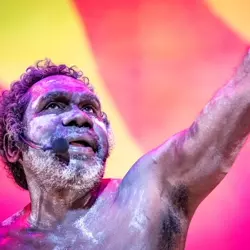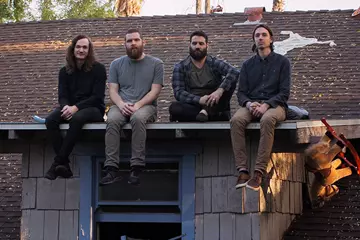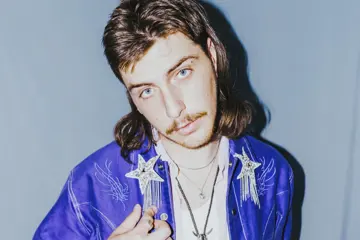 Yothu Yindi
Yothu YindiThe whole world got to know Australia's most successful primarily Indigenous band Yothu Yindi in the early '90s. It came about when the dance remix collective Filthy Lucre – former I'm Talking guitarist Robert Goodge with respected Melbourne house DJs Paul Main and Gavin Campbell – took a song the band recorded called Treaty and turned it into a big dance hit, peaking at #11 in the Australian charts. It picked up the ARIA awards for Song Of The Year and Single Of The Year in 1992, with the album from which it came, Tribal Voice, picking up the ARIA for Best Indigenous Release. Released by Hollywood Records in the US, Treaty reached #6 on the Billboard Hot Dance Club Play singles charts and a respectable #72 in the mainstream chart, Tribal Voice, peaking at #3 in the Billboard World Music album charts.
But like all great bands, Yothu Yindi's story began long before Treaty's success. Yothu Yindi began in the imagination of the group's leader, Mandawuy Yunupingu, in 1986 when he was studying for his BA in Education at Deakin University. “I was playing on and off with a band that came from Darwin,” Yunupingu recalls of The Swamp Jockeys, “and I got to know the band members and I was thinking about forming a band that I'd one day lead – and that's when the idea of Yothu Yindi came. Back in my home community in Yirrkala [in North East Arnhem Land] I used to have a band called Brothers.”
Three members of The Swamp Jockeys – lead guitarist Cal Williams, bass player Stuart Kellaway and drummer Andrew Belletty – joined Yunupingu and his younger brother (aka Yoki Yoku – they don't have the same mother and father, but through the kinship have the same surname), keyboards player Geoffrey Gurrumul Yunupingu, plus his nephews Witiyana Marika - traditional singer (manikay), bilma (clapsticks) player and dancer - and Milkayngu Mununggurr - a didgeridoo player - in Yothu Yindi. The band name itself is derived from two Yolngu words – Yolngu being the language used in Yunupingu's part of Arnhem Land – that roughly translate as the kinship term “child and mother”; Aboriginals and non-Aboriginals (or Balanda), working and playing together in a true fusion of the two cultures, traditional and contemporary, promoting mutual respect and understanding.
Yunupingu's commitments as the principal of the Yirrkala Community School meant that touring with the band had to wait until school holidays. But, the band quickly built a reputation that saw them invited to perform at some major festivals. In 1988, as part of the Bicentennial celebrations, they were invited to play the Barunga festival in the Northern Territory which the then Australian Prime Minister Bob Hawke was invited to attend. It was here that Hawke promised a treaty be formed with Indigenous Australians by 1990. Hearing this and sitting around a campfire later that day, Yunupingu was inspired to write the catchphrase that would become such an important part of Treaty: “Well I heard it on the radio/And I saw it on the television.”
Don't miss a beat with our FREE daily newsletter
As the Bicentennial year progressed, Yothu Yindi were invited to perform at the South Pacific Festival of the Arts in Townsville and then asked to represent Australia at the Cultural Olympic Games in Seoul, South Korea. The band also took part in a fundraising concert at Bondi Pavilion, put on by the Bicentennial Protest Group at the beginning of 1988, that was compered by Aboriginal activist Gary Foley and Midnight Oil singer, Peter Garrett. Their performance obviously impressed the future Labor minister because the Oils took Yothu Yindi to North America to support them on their 32-date tour that year. Garrett would later also add a little to the constructing of the song Treaty.
On their return to Australia, Mushroom Records signed Yothu Yindi and they released their debut album, Homeland Movement, recorded in a day and mixed in another. Produced by Les Karski, who originally came to Australia as the guitarist with UK funk outfit Supercharge, it included singles Mainstream and Djapana (Sunset Dreaming), the latter a song Yunupingu wrote in 1985 while teaching on Elcho Island. Neither charted, but the album has sold more than 50,000 copies since its release in May 1989.
“At that time I was starting to develop a wider circle,” Yunupingu remembers. “I wanted to test myself, making sure that I was doing the right thing in seeking recognition and making myself known to the world and to Australia that we meant business.”
As principal of Yirrkala Community School, meanwhile, Yunupingu set about implementing a radical curriculum that combined both Balanda and Yolngu education processes to provide students with the best aspects of both cultures, something that, of course, he was promoting through the music and performances, which included traditional Yolngu dances, of Yothu Yindi.
The year 1991 saw the band record their second album, Tribal Voice, produced by former Australian, now Nashville-based Mark Moffatt, on which they revisited Djapana (Sunset Dreaming) and that song that Yunupingu had been chipping away at since the Bicentennial, Treaty, which he finally finished with the help of Paul Kelly.
“I would stay at his place when I came to Sydney and we would sit well into the night and write the songs that we would explore, more lyrically what the songs meant and how it would sit in the minds of people.”
On its initial release, Treaty did pretty modest business, but when the Filthy Lucre remix was released it exploded, spending 22 weeks in the Australian charts, the first song 'in language' - in this case Gumatj - to gain extensive airplay and international recognition.
After the band was invited to perform at the New Music Seminar in New York City later in 1991, Yothu Yindi signed a six-album deal with US label, Hollywood Records. Treaty also won the band the 1991 Song Of The Year award from APRA, as well as picking up the Human Rights Commission award for songwriting, while the film clip won Best Australian Video at both the Australian Music Awards and MTV Awards.
“I was really staggered,” Yunupingu admits, “when I heard the remix it made me want to explore more what technology would do for songs I would write one day.” As he told Drum Media's Mark Mordue on the eve of playing the Sydney Big Day Out in January 1992 (where, incidentally, they played after Nirvana in the Hordern Pavilion), “Treaty takes you into Yolngu way of thinking. We're being part of the influence factor. Making a way into the common objectives, reaching it already in your mind with the song.”
Perhaps the biggest honour came towards the end of 1992, when Yothu Yindi represented Australia at the launch of the United Nations International Year of Indigenous Peoples at the UN Headquarters in New York. The following year, Prime Minister Paul Keating named Mandawuy Yunupingu Australian Of The Year. The revised version of Djapana, released as the second single from Tribal Voice, got to #13 in the Australian charts and won Best Indigenous Record and Best Video at the 1993 ARIAs. Tribal Voice, meanwhile, had peaked at #4 in June 1992 and remained in the charts for 45 weeks, achieving double platinum status, selling more than 140,000 copies in Australia.
Through 1993, Yothu Yindi toured extensively through Australia, Japan and Europe, before releasing their third album, Freedom, which included a song called Dots On The Shells, which Yunupingu wrote with Neil Finn, then riding the Crowded House wave. Over these years, the line-up changed quite a bit, expanding to include additional backing singers and dancers, among them Natalie Gillespie and Jodie Cockatoo Creed, while former Not Drowning Waving drummer Ben Hakalitz also entered the fold. In 1995, Gurrumul Yunupingu left to start his own Saltwater Band and has, of course, more recently become a major international artist in his own right.
Their fourth album, 1996's Birrkuta – Wild Honey, was recorded in both Sydney and London, and included a song called Superhighway, co-written with INXS' Andrew Farriss, which became Yothu Yindi's next single.
“I happened to be at an INXS concert and Andrew saw me and we sang – I think it was Treaty – and I happened to be on my way to America and he happened to get the same plane, so we got to talk to each other. Later, when we were recording the album in London, he took me to Abbey Road Studios and I was glad to have walked in [The Beatles'] footsteps, and I recorded Superhighway there.”
Farriss would later produce the band's final album, 2000's Garma. Meanwhile, Yothu Yindi's touring schedule saw them performing across Australasia, Europe, the UK, the US, Canada, Japan and, in 1997, South Africa under the auspices of the Fred Hollows Foundation.
In 1998, they found themselves in Dublin, Ireland, recording their fifth album, One Blood, which featured guest contributions by Hothouse Flowers' Liam O'Maonlai and Simple Minds' Jim Kerr. The title track was another co-write with Paul Kelly, while again, some tracks from earlier albums were revisited. Before that, however, Mandawuy Yunupingu was invited to contribute his voice to a version of I Am Australian by Judith Durham. The song, co-written by The Seekers' Bruce Woodley and The Bushwackers' Dobe Newton, also included the voice of Air Supply's Russell Hitchcock. It reached #17 in the ARIA Singles chart in June 1997.
Always conscious of his own community back in Yirrkala, in 1999, Yunupingu and Yothu Yindi started the now annual Garma Festival. And, through the Yirrkala Foundation, launched their Yirrnga recording studio in the band's homelands at Gunyangara. Mandawuy has continued to use the studio to write and record songs that have yet to see the light of day. It was at Gunyangara and in Sydney that Yothu Yindi recorded their sixth and final album, Garma, released in 2000, launched appropriately enough at that year's Garma Festival in Gulkala. Yothu Yindi got to share a bill with Midnight Oil once more when they were invited to perform at the closing ceremony of the Sydney Olympic Games.
Though there have been no more records, for the moment, Yothu Yindi continued to perform. The band played at successive Garma Festivals - in 2010, Yunupingu relinquished his involvement with the Garma Festival, his position taken over by his brother Galarrwuy Yunupingu, at the Yeperenye Festival in Alice Springs in 2001 and the Shoalhaven Thank You Concert in 2002. In 2003, they toured Australia with Santana and played the East Coast Blues And Roots Festival in Byron Bay.
In 2008, however, Mandawuy Yunupingu was diagnosed with end stage renal disease. He's recorded a new song, Healing Stone (co-written with Andrew Farriss), the first new song to be released in a dozen years. The track is included on a new best-of collection by the same name celebrating the legacy of Yothu Yindi in recognition of their induction into the ARIA Hall Of Fame on Thursday 29 November at the Sydney Entertainment Centre.
“It's about the disease I have right now,” Yunupingu explains, “and the condition I'm in, to help me tell more people about how Aboriginal people are prone to diseases of the kidney.
“So many people are in this condition, affected by the disease and would look at the possibility of a cure to it. The song talks about a cure and the fact that my mother was seen to have healing hands; that women were said to be healers in our world before the doctors and the nurses came.”
DISCOGRAPHY
Albums
Homeland Movement – Mushroom, May 1989
Tribal Voice – Mushroom, October 1991
Freedom – Mushroom, November 1993
Wild Honey (Birrkuta) – Mushroom, August 1996
One Blood – Mushroom, 1998
Garma – Mushroom, 2000
Singles
Djapana – Mushroom, 1989
Mainstream – Mushroom, 1989
Treaty – Mushroom, 1991
Treaty (12” Filthy Lucre Remix) – Mushroom, 1991
Djapana – Mushroom, 1992
Tribal Voice (7” K-Class Club Mix) – 1992
Treaty (7” William Orbit Remix) – Mushroom, 1992
World Turning EP – Mushroom, 1993
Timeless Land – Mushroom, 1994
Dots On The Shells – Mushroom, 1994
Superhighway – Mushroom, 1996
Community Life – Mushroom, 2000
Treaty (12” Dario G Remix) – Mushroom, 2000















